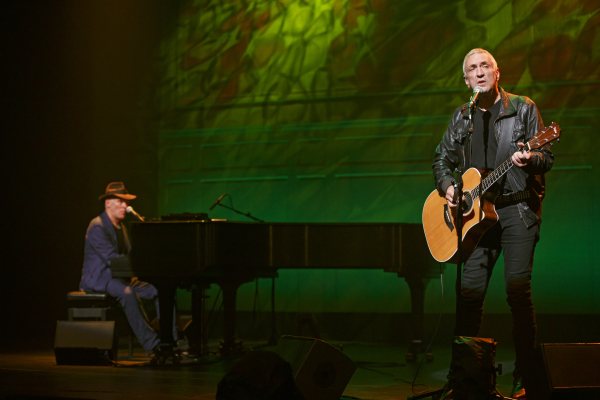
Pianist Stewart D’Arrietta and John R. Waters tell the story of John Lennon in music and words in THROUGH A GLASS ONION (photo by Joan Marcus)
Union Square Theatre
100 East 17th St. between Park Ave. S. & Irving Pl.
Tuesday – Sunday through January 11, $68-$88
800-982-2787
www.lennononstage.com
The main poster image for Lennon: Through a Glass Onion shows a psychedelically colored John Lennon staring back at the viewer, with two huge white holes where his eyes would be. Too much of that round emptiness, unfortunately, can be found in the two-man musical play as well. British-born Australian actor and musician John R. Waters, who will turn sixty-six on December 8, the thirty-fourth anniversary of the murder of the Smart Beatle in New York City, and pianist Stewart D’Arrietta have been touring the stripped-down production for more than twenty years. For ninety minutes, Waters, dressed in jeans, a black T-shirt, and a leather jacket, does not try to imitate Lennon as much as embody his spirit in a kind of VH1 Storytellers manner, relating episodes from John’s life, told in the first person, to the songs he wrote. He also tries to get inside Lennon’s head, imagining what the musician and peace activist might have been thinking during some of those seminal moments, but these brief narrative vignettes often feel forced, especially when Waters is discussing the day of Lennon’s death, which open and close the show. (It’s more effective when Waters incorporates Lennon’s actual words, from interviews and writings.) The music, for the most part, is splendid; Waters lets Lennon’s skills as a wordsmith shine, the intelligent, intense lyrics reverberating throughout the hazy Union Square Theatre and inside your head. He wisely doesn’t even try to mimic Lennon’s singing voice or guitar playing, instead audaciously toying around with some of the music, reinventing such songs as “Help,” “Norwegian Wood,” “Crippled Inside,” and “Working Class Hero” in inventive, at times captivating ways, with a particular focus on the White Album.
In “How Do You Sleep?,” Lennon’s public attack on songwriting partner Paul McCartney, Anthony Barrett’s lighting casts Waters’s huge shadow on the back wall, highlighting the size of the boots Waters has dared to step into, but it also emphasizes one of the faults of the show; only a few times does it step out of its own boots, curiously using visual projections for just two songs (one of which, of course, is “Lucy in the Sky with Diamonds”). And the vast majority of the nearly three dozen tunes, from the Beatles and the Plastic Ono Band periods through John’s solo career, right up to Double Fantasy, are heard in snippets that merely tease. D’Arrietta, who has toured his own one-man show featuring the music of Tom Waits, is masterful at the keyboards, often sounding like an entire backing band, fleshing out the arrangements and contributing background vocals as well. Lennon: Through a Glass Onion is at its best when dealing with John’s relationship with Yoko, who many fans still insist was the cause of the Fab Four breakup; renditions of “Woman” and “Beautiful Boy (Darling Boy)” are among the highlights of the evening. “I’m just a lad from up north,” Waters says as Lennon at one point. John, of course, was so much more than that, but Lennon: Through a Glass Onion, though heartfelt, doesn’t quite add anything new about the man or the legend.